Safe House 1-3 Read online
Safe House
( 1-800-Where-R-You - 3 )
Meg Cabot
1-800-WHERE-R-YOU
Safe House
Jenny Carroll
With many thanks to Jen Brown, John Henry Dreyfuss, David Walton, and especially Benjamin Egnatz.
Contents
Chapter 1
Chapter 2
Chapter 3
Chapter 4
Chapter 5
Chapter 6
Chapter 7
Chapter 8
Chapter 9
Chapter 10
Chapter 11
Chapter 12
Chapter 13
Chapter 14
Chapter 15
Chapter 16
Chapter 17
Chapter 18
Chapter 19
Chapter 20
C H A P T E R
1
I didn't know about the dead girl until the first day of school.
It wasn't my fault. I swear it wasn't. I mean, how was I supposed to have known? It wasn't like I'd been home. If I'd been home, of course I would have seen it in the paper, or on the news, or whatever. I would have heard people talking about it.
But I hadn't been home. I'd been stuck four hours north of home, at the Michigan dunes, in my best friend Ruth Abramowitz's summer-house. The Abramowitzes go to the dunes for the last two weeks of August every summer, and this year, they invited me to go along.
I wasn't going to go at first. I mean, who'd want to spend two weeks trapped in a summer-house with Ruth's twin brother Skip? Um, not me. Skip still chews with his mouth open even though he is sixteen and should know better. Plus he is like Grand Dragon Master of our town's Dungeons & Dragons population, in spite of the Trans Am he bought with his bar mitzvah money.
On top of which, Mr. Abramowitz has this thing about cable, and the only telephone he'll allow in his vacation house is his cell, which is reserved for emergency use only, like if one of his clients gets thrown in the clink or whatever. (He's a lawyer.)
So you can see, of course, why I was like, "Thanks, but no thanks," to Ruth's invitation.
But then my parents said that they were spending the last two weeks of August driving my brother Mike and all his stuff up to Harvard, where he was going to be starting his freshman year, and that Great-aunt Rose would be coming to stay with me and my other brother, Douglas, while they were gone.
Never mind that I am sixteen and Douglas is twenty and that we do not need parental supervision, particularly in the form of a seventy-five-year-old lady who is obsessed with solitaire and my sex life (not that I have one). Great-aunt Rose was coming to stay, and I was informed that I could like it or lump it.
I chose neither. Instead of coming home after my stint as a camp counselor at the Lake Wawasee Camp for Gifted Child Musicians, which was how I got to spend my summer vacation, I went with the Abramowitzes to the dunes.
Hey. Even watching Skip eat grilled peanut-butter-and-banana sandwiches morning, noon, and night for two weeks beat spending five minutes with Great-aunt Rose, who likes to talk about how in her day, only cheap girls wore dungarees.
Seriously. Dungarees. That's what she calls them.
You can see why I chose the dunes instead.
And truthfully, the two weeks didn't go so badly.
Oh, don't get me wrong. I didn't have a good time or anything. How could I? Because while we'd been slaving away at Camp Wawasee, Ruth had been working very hard on her teen social development, and she'd managed to acquire a boyfriend.
That's right. An actual boyfriend, whose parents—wouldn't you know it—also had a house on the dunes, like ten minutes away from Ruth's.
I tried to be supportive, because Scott was Ruth's first real boyfriend—you know, the first guy she'd liked who actually liked her back, and who didn't seem to mind being seen holding her hand in public, and all of that.
But let's face it, when someone invites you to stay with them for two weeks, and then spends those two weeks basically hanging out with somebody else, it can be a little disappointing. I spent the majority of my daylight hours lying on the beach, reading used paperbacks, and most of my nights trying to beat Skip at Crash Bandicoot on his Sony Playstation.
Oh, yeah. It was a real thrill, my summer vacation.
The good part, Ruth kept pointing out to me, was that by being at the dunes, I was not at my house waiting for my boyfriend—or whatever he is—to call. This, Ruth informed me, was an important part of the courtship ritual . . . you know, the not-being-there-when-he-calls part. Because then, Ruth explained, he'll wonder where you are, and start making up these scenarios in his head about where you could be. Maybe he'll even think you're with another guy!
Somehow, this is supposed to make him like you more.
Which is all good, I guess, but is sort of contingent on one thing:
The guy actually has to call.
See, if he doesn't call, he can't discover that you aren't home. My boyfriend—or should I say, the guy I like, since he is not technically my boyfriend, as we have never been out on an actual date—never calls. This is because he is of the opinion that I am what is commonly referred to in the great state of Indiana as jailbait.
And he's already on probation.
Don't ask me what for. Rob won't tell me.
That's his name. Rob Wilkins. Or the Jerk, as Ruth refers to him.
But I don't think it's fair to call him the Jerk, because it isn't as if he ever led me on. I mean, he made it pretty much clear from the moment he found out I was sixteen that there could never be anything between us. At least, not for a couple more years.
And really, you know, I am fine with that. I mean, there are lots of fish in the sea.
And okay, maybe they don't all have eyes the color of fog as it rolls in over the lake just before sunrise, or a set of washboard abs, or a completely cherried-out Indian motorcycle they've rebuilt from scratch in their barn.
But, you know, they're male. Ostensibly.
Whatever. The point is, I was gone for two weeks: no phone, no TV, no radio, no media resources whatsoever. It was a vacation, all right? A real vacation. Well, except for the having fun part.
So how was I supposed to know that while I was gone, a girl in my class had croaked? No one mentioned a word about it to me.
Not until homeroom, anyway.
That's the problem, really, with living in such a small town. I've been in the same homeroom with the same people since middle school. Oh, sure, occasionally somebody will move out of town, or a new kid will show up. But for the most part, it's the same old faces, year after year.
Which was why, the first day of my junior year at Ernest Pyle High School, I slid into the second seat from the door in homeroom. I always ended up in the second seat from the door in homeroom. That's because, in homeroom, we sit alphabetically, and my last name—Mastriani—puts me second in the Ms for my class, behind Amber Mackey. Amber Mackey always sits in front of me in homeroom. Always.
Except that day. That day, she didn't show up.
Hey, I didn't know why. How was I supposed to know? Amber had never not shown up for the first day of school before. She was no more of an intellectual dynamo than I am, but you never actually do anything the first day of school, so why not show up? Besides, unlike me, Amber had always liked school. She was a cheerleader. She was always all, "We've got spirit, yes, we do, we've got spirit, how ’bout you?"
You know the type.
A type like that, I don't know, you'd expect she'd show up the first day of school, just in order to show off her tan.
So I left the first chair in the row of seats by the door empty. Everyone filed in, looking carefully nonchalant, even though you knew most of them—the girls, anyway—had
spent hours putting together exactly the right outfit to show off how much weight they'd lost over their summer … or their new highlights … or their chemically whitened teeth.
Everyone sat down where they were supposed to—we'd done this enough times to know by the eleventh grade who sat behind whom in homeroom—and people were all, "Hey, how was your summer?" or "Oh, my God, you're so tan," or "That skirt is so cute!"
And then the bell rang, and Mr. Cheaver came in with the roster and told us all to settle down, even though at eight fifteen in the morning, nobody was exactly boisterous.
Then he looked down at the roster, hesitated, and said, "Mastriani."
I raised my hand, even though Mr. Cheaver was standing practically in front of me, and had had me last year for World Civ, so it wasn't as if he didn't recognize me. Granted, Ruth and I had spent a considerable amount of our Wawasee paychecks at the clothing outlet stores outside Michigan City, and I was wearing, at Ruth's insistence, an actual skirt to school, something that might have thrown Mr. C off a little, since I had never before shown up to school in anything besides jeans and a T-shirt.
Still, as Ruth pointed out, I was never going to get Rob to realize how much he had erred in not going out with me unless I got someone else to take me out (and was seen by Rob in this other person's company), so, according to Ruth, I had to "make an effort" this year. I was in Esprit from head to toe, but it wasn't as much that I was hoping to attract potential suitors as it was that, having gotten back as late as I had the night before (Ruth absolutely refuses to exceed the speed limit when she drives, even when there is not a culvert in sight in which a highway patrolman could be hiding), I had no other clean clothes.
Maybe, I thought, Mr. Cheaver doesn't recognize me in my miniskirt and cotton sweater set. So I went, "Here, Mr. C," to show him I was present.
"I can see you, Mastriani," Mr. C said, in his usual lazy drawl. "Move up one."
I looked at the empty seat in front of me.
"Oh, no, Mr. C," I said. "That's Amber's seat. She must be late or something. But she'll be here."
There was a strange silence. Really. I mean, not all silences are the same, even though you would think by definition—the absence of sound—they would be.
This one, however, was more silent than most silences. Like everyone, all at once, had suddenly decided to hold their breath.
Mr. Cheaver—who was also holding his breath—narrowed his eyes at me. There weren't many teachers at Ernie Pyle High whom I could stand, but Mr. C was one of them. That's because he didn't play favorites. He hated every single one of us just about equally. He maybe hated me a little less than some of my peers, because last year, I had actually done the homework he'd assigned, as I'd found World Civ quite interesting, especially the parts about the wholesale slaughter of entire populations.
"Where have you been, Mastriani?" Mr. Cheaver wanted to know, "Amber Mackey's not coming back this year."
Seriously, how was I to have known?
"Oh, really?" I said. "Did her parents move or something?"
Mr. C just looked at me in a very displeased manner, while the rest of the class suddenly exhaled, all at once, and started buzzing instead. I had no idea what they were talking about, but from the scandalized looks on their faces, I could tell I had really put my foot in it this time. Tisha Murray and Heather Montrose looked particularly contemptuous of me. I thought about getting up and cracking their heads together, but I've tried that before, and it doesn't actually work.
But another thing I was trying to "make an effort" to do my junior year—besides cause some innocent young man to fall completely in love with me so I could stroll, ever so casually, hand-in-hand with him in front of the garage where Rob had been working since he graduated last year—was not get into fistfights. Seriously. I had spent enough weeks in detention back in tenth grade thanks to my inability to control my rage impulse. I was not going to make the same mistake this year.
That was one of the other reasons—besides my total lack of clean Levis—that I'd gone for the miniskirt. It wasn't so easy to knee somebody in the groin while clad in a Lycra/rayon blend.
Maybe, I thought, as I observed the expressions of the people around me, Amber had gotten herself knocked up, and everyone knew it but me. Hey, in spite of Coach Albright's Health class, mandatory for all sophomores, in which we were warned of the perils of unsafe sex, it happens. Even to cheerleaders.
But apparently not to Amber Mackey, since Mr. C looked down at me and went, tonelessly, "Mastriani. She's dead."
"Dead?" I echoed. "Amber Mackey?" Then, like an idiot: "Are you sure?"
I don't know why I asked him that. I mean, if a teacher says somebody is dead, you can pretty much count on the fact that he's telling the truth. I'd just been so surprised. It probably sounds like a cliche, but Amber Mackey had always been . . . well, full of life. She hadn't been one of those cheerleaders you could hate. She'd never been purposefully mean to anyone, and she'd always had to try really hard to keep up with the other girls on the squad, both socially as well as athletically. Academically, she'd been no National Merit Scholar, either, if you get my drift.
But she'd tried. She'd always really tried.
Mr. C wasn't the one who answered me. Heather Montrose was.
"Yeah, she's dead," she said, her carefully glossed upper lip raised in disgust. "Where have you been, anyway?"
"Really," Tisha Murray said. "I'd have thought Lightning Girl would have had a clue, at least."
"What's the matter?" Heather asked me. "Your psychic radar on the fritz or something?"
I am not precisely what you would call popular, but since I do not make a habit of going around being a total bitch to people, like Heather and Tisha, there are folk who actually will come to my defense against them. One of them, Todd Mintz—linebacker on the varsity football team who was sitting behind me—went, "Jesus, would you two cool it? She doesn't do the psychic thing anymore. Remember?"
"Yeah," Heather said, with a flick of her long, blonde mane. "I heard."
"And I heard," Tisha said, "that just two weeks ago, she found some kid who'd been lost in a cave or something."
This was patently untrue. It had been a month ago. But I wasn't about to admit as much to the likes of Tisha.
Fortunately, I was spared from having to make any reply whatsoever by the tactful intervention of Mr. Cheaver.
"Excuse me," Mr. C said. "But while this may come as a surprise to some of you, I have a class to conduct here. Would you mind saving the personal chat until after the bell rings? Mastriani. Move up one."
I moved up one seat, as did the rest of our row. As we did so, I whispered to Todd, "So what happened to her, anyway?" thinking Amber had gotten leukemia or something, and that the cheerleaders would probably start having car washes all the time in order to raise money to help fight cancer. The Amber Fund, they'd probably call it.
But Amber's death had not been from natural causes, apparently. Not if what Todd whispered back was the truth.
"They found her yesterday," he said. "Facedown in one of the quarries. Strangled to death."
Oh.
C H A P T E R
2
Now, who would do that?
Seriously. I want to know.
Who would strangle a cheerleader, and dump her body at the bottom of a limestone quarry?
I can certainly understand wanting to strangle a cheerleader. Our school harbors some of the meanest cheerleaders in North America. Seriously. It's like you have to pass a test proving you have no human compassion whatsoever just to get on the squad. The cheerleaders at Ernest Pyle High would sooner pluck out their own eyelashes than deign to speak to a kid who wasn't of their social caliber.
But actually to go through with it? You know, off one of them? It hardly seemed worth the effort.
And anyway, Amber hadn't been like the others. I had actually seen Amber smile at a Grit—the derogatory name for the kids who were bused in from the rural routes to Er
nie Pyle, the only high school in the county; kids who did not live on a rural route are referred to, imaginatively, as Townies.
Amber had been a Townie, like Ruth and me. But I had never observed her lording this fact over anyone, as I often had Heather and Tisha and their ilk. Amber, when selected as a team captain in PE, had never chosen all Townies first, then moved on to Grits. Amber, when walking down the hall with her books and pompons, had never sneered at the Grits' Wranglers and Lee jeans, the only "dungarees" they could afford. I had never seen Amber administer a "Grit test": holding up a pen and asking an unsuspecting victim what she had in her hand. (If the reply was "A pen," you were safe. If, however, you said, "A pin," you were labeled a Grit and laughed at for your Southern drawl.)
Is it any wonder that I have anger-management issues? I mean, seriously. Wouldn't you, if you had to put up with this crap on a daily basis?
Anyway, it just seemed to me a shame that, out of all the cheerleaders, Amber had been the one who'd had to die. I mean, I had actually liked her.
And I wasn't the only one, as I soon found out.
"Good job," somebody hissed as they passed me in the hallway while I walked to my locker.
"Way to go," somebody else said as I was coming out of Bio.
And that wasn't all. I got a sarcastic "Thanks a lot, Lightning Girl," by the drinking fountains and was called a "skank" as I went by a pack of Pompettes, the freshmen cheerleaders.
"I don't get it," I said to Ruth in fourth period Orchestra as we were unpacking our instruments. "It's like people are blaming me or something for what happened to Amber. Like I had something to do with it."
Ruth, applying rosin to her cello bow, shook her head.
"That's not it," she said. She had gotten the scoop, apparently, in Honors English. "I guess when Amber didn't come home Friday night, her parents called the cops and stuff, but they didn't have any luck finding her. So I guess a bunch of people called your house, you know, thinking you might be able to track her down. You know. Psychically. But you weren't home, of course, and your aunt wouldn't give any of them my dad's emergency cell number, and there's no other way to reach us up at our summer place, so …"

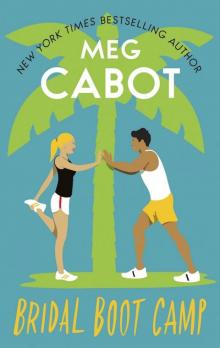 Bridal Boot Camp
Bridal Boot Camp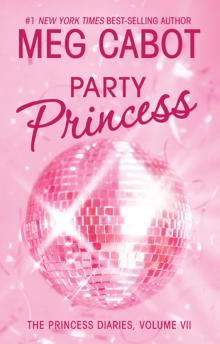 Party Princess
Party Princess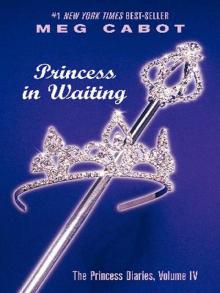 Princess in Waiting
Princess in Waiting Being Nikki
Being Nikki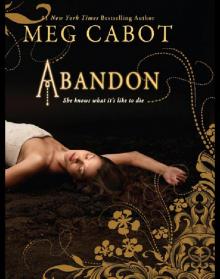 Abandon
Abandon Princess on the Brink
Princess on the Brink Darkest Hour
Darkest Hour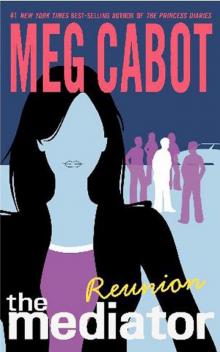 Reunion
Reunion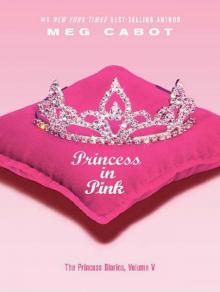 Princess in Pink
Princess in Pink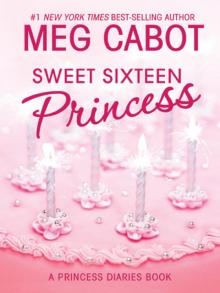 Sweet Sixteen Princess
Sweet Sixteen Princess The Princess Diaries
The Princess Diaries Airhead
Airhead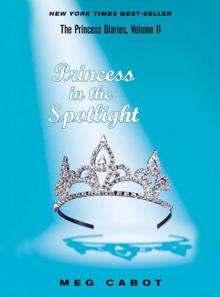 Princess in the Spotlight
Princess in the Spotlight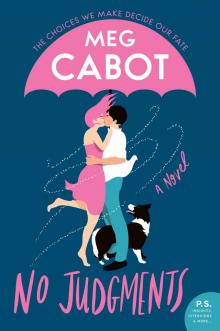 No Judgments
No Judgments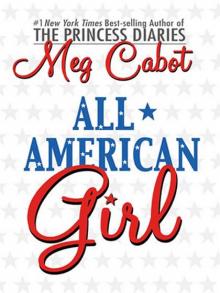 All-American Girl
All-American Girl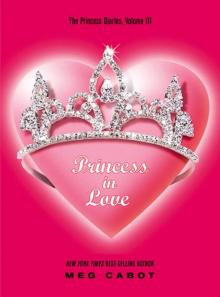 Princess in Love
Princess in Love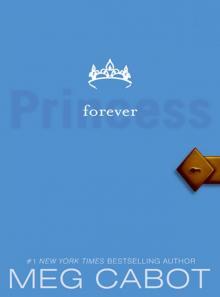 Forever Princess
Forever Princess Haunted
Haunted Shadowland
Shadowland Twilight
Twilight Princess Mia
Princess Mia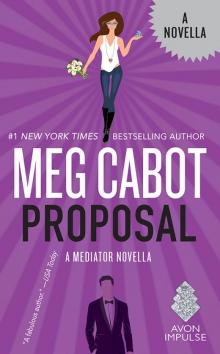 Proposal
Proposal Remembrance
Remembrance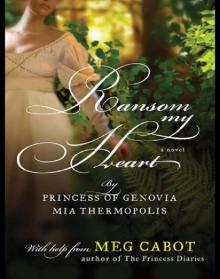 Ransom My Heart
Ransom My Heart Underworld
Underworld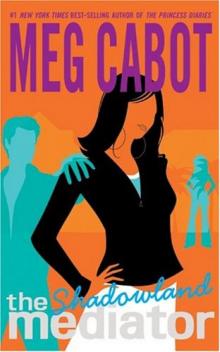 Shadowland tm-1
Shadowland tm-1 Size 14 Is Not Fat Either
Size 14 Is Not Fat Either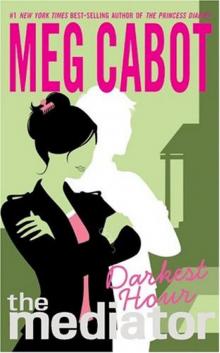 Darkest Hour tm-4
Darkest Hour tm-4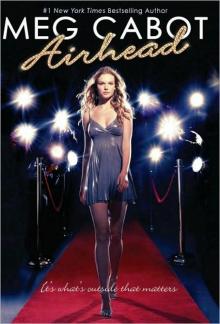 Airhead a-1
Airhead a-1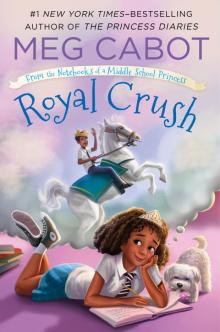 Royal Crush
Royal Crush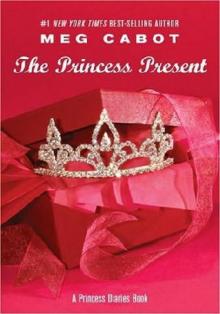 The Princess Present (princess diaries)
The Princess Present (princess diaries)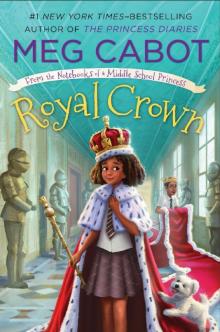 Royal Crown
Royal Crown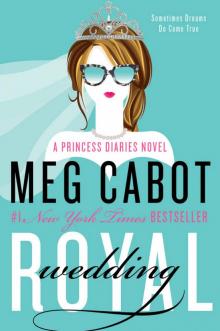 Royal Wedding: A Princess Diaries Novel (The Princess Diaries Book 11)
Royal Wedding: A Princess Diaries Novel (The Princess Diaries Book 11)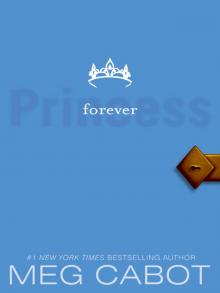 Princess Diaries, Vol. X: Forever Princess
Princess Diaries, Vol. X: Forever Princess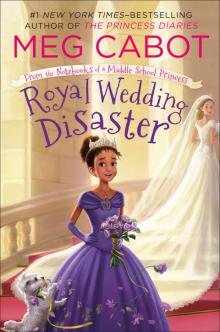 Royal Wedding Disaster
Royal Wedding Disaster Allie Finkle's Rules for Girls: Glitter Girls and the Great Fake Out
Allie Finkle's Rules for Girls: Glitter Girls and the Great Fake Out Size 12 Is Not Fat hwm-1
Size 12 Is Not Fat hwm-1 Princess on the Brink pd-8
Princess on the Brink pd-8 The New Girl
The New Girl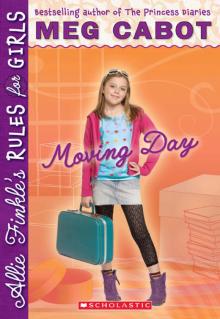 Allie Finkle's Rules for Girls: Moving Day
Allie Finkle's Rules for Girls: Moving Day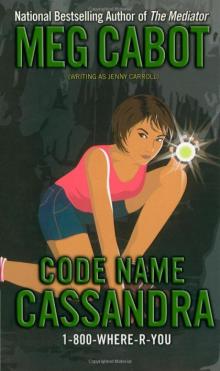 Code Name Cassandra
Code Name Cassandra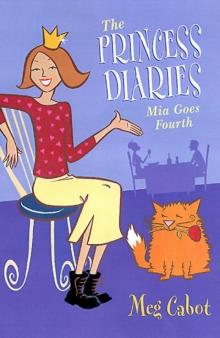 Mia Goes Fourth pd-4
Mia Goes Fourth pd-4 Sanctuary 1-4
Sanctuary 1-4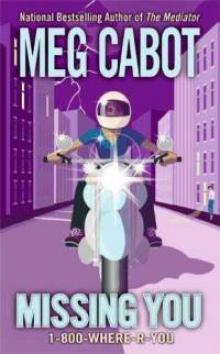 Missing You 1-5
Missing You 1-5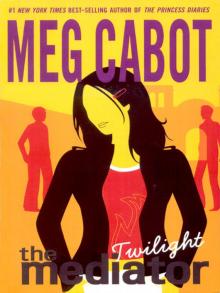 The Mediator 6: Twilight
The Mediator 6: Twilight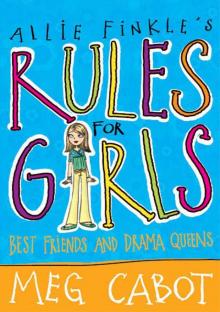 Allie Finkle's Rules for Girls: Best Friends and Drama Queens
Allie Finkle's Rules for Girls: Best Friends and Drama Queens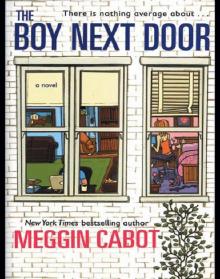 The Boy Next Door
The Boy Next Door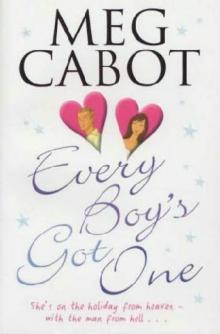 Every Boy's Got One
Every Boy's Got One Princess Mia pd-9
Princess Mia pd-9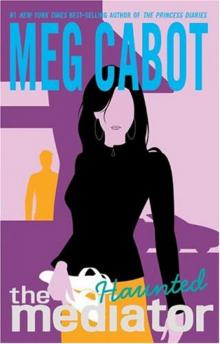 Haunted tm-5
Haunted tm-5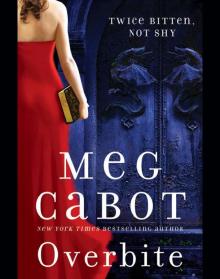 Overbite
Overbite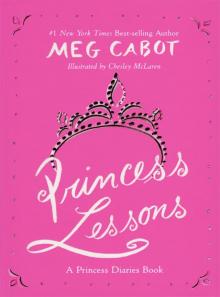 Princess Lessons
Princess Lessons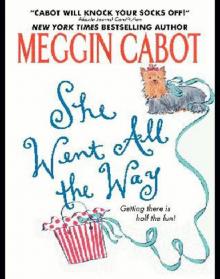 She Went All the Way
She Went All the Way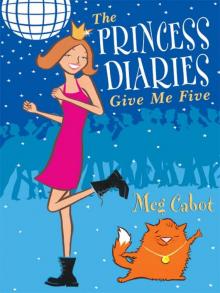 Give Me Five pd-5
Give Me Five pd-5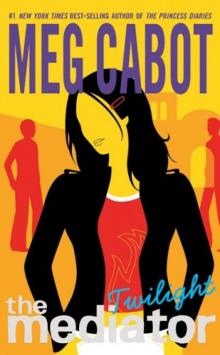 Twilight tm-6
Twilight tm-6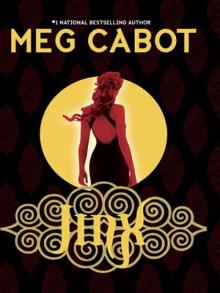 Jinx
Jinx Runaway (Airhead #3)
Runaway (Airhead #3)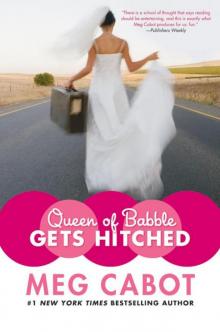 Queen of Babble Gets Hitched qob-3
Queen of Babble Gets Hitched qob-3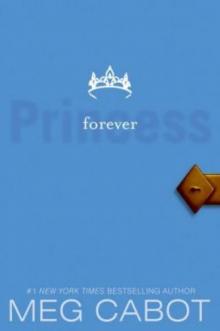 Forever Princess pd-10
Forever Princess pd-10 Queen of Babble
Queen of Babble Boy Meets Girl b-3
Boy Meets Girl b-3 Pants on Fire
Pants on Fire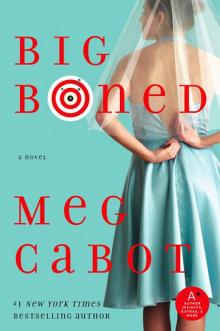 Big Boned ху-3
Big Boned ху-3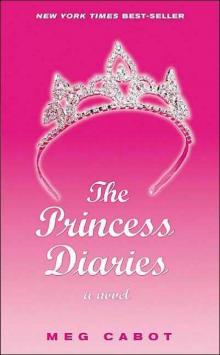 Princess' Diaries pd-1
Princess' Diaries pd-1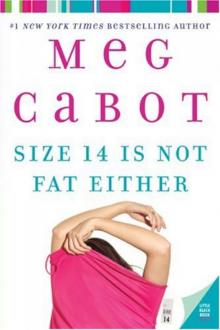 Size 14 Is Not Fat Either hwm-2
Size 14 Is Not Fat Either hwm-2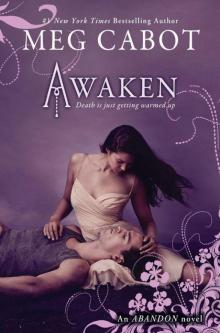 Awaken a-3
Awaken a-3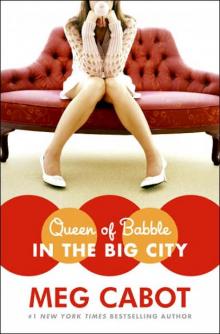 Queen Of Babble: In The Big City qob-2
Queen Of Babble: In The Big City qob-2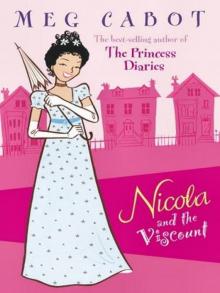 Nicola and the Viscount
Nicola and the Viscount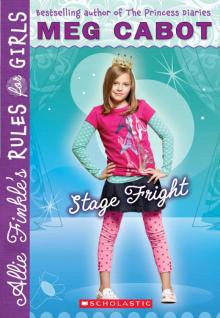 Allie Finkle's Rules for Girls: Stage Fright
Allie Finkle's Rules for Girls: Stage Fright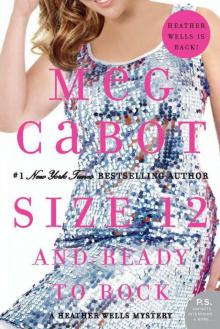 Size 12 and Ready to Rock
Size 12 and Ready to Rock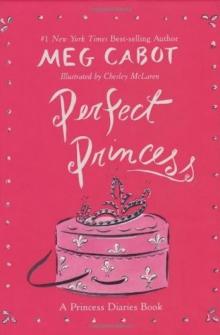 Perfect Princess
Perfect Princess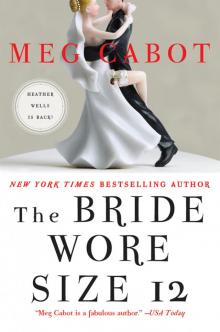 The Bride Wore Size 12
The Bride Wore Size 12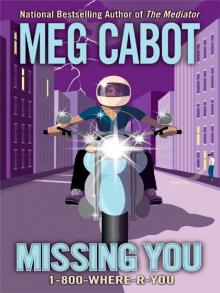 1-800-Where-R-You: Missing You
1-800-Where-R-You: Missing You How to Be Popular
How to Be Popular Queen of Babble Bundle with Bonus Material
Queen of Babble Bundle with Bonus Material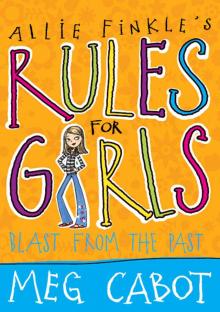 Allie Finkle's Rules for Girls: Blast from the Past
Allie Finkle's Rules for Girls: Blast from the Past Princess in the Spotlight pd-2
Princess in the Spotlight pd-2 Ready or Not
Ready or Not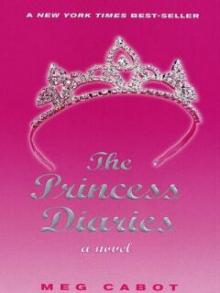 The Princess Diaries I
The Princess Diaries I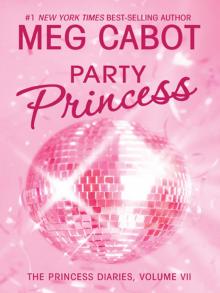 Party Princess pd-7
Party Princess pd-7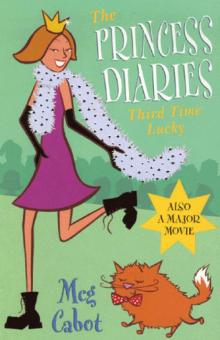 Third Time Lucky pd-3
Third Time Lucky pd-3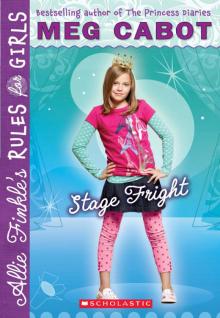 Stage Fright
Stage Fright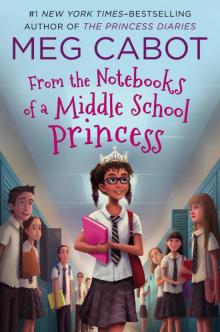 From the Notebooks of a Middle School Princess
From the Notebooks of a Middle School Princess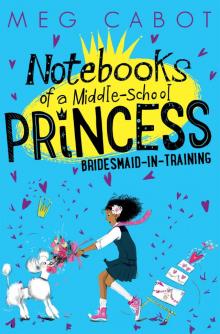 Notebooks of a Middle-School Princess Bridesmaid-in-Training
Notebooks of a Middle-School Princess Bridesmaid-in-Training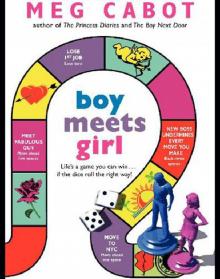 Boy Meets Girl
Boy Meets Girl Missing You
Missing You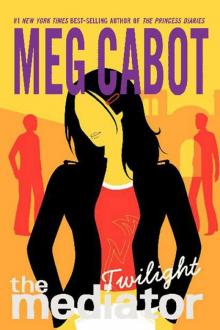 The Twilight
The Twilight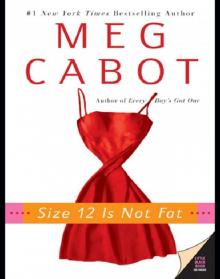 Size 12 Is Not Fat
Size 12 Is Not Fat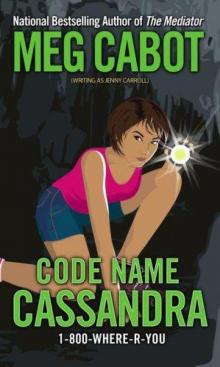 Code Name Cassandra 1-2
Code Name Cassandra 1-2 Valentine Princess
Valentine Princess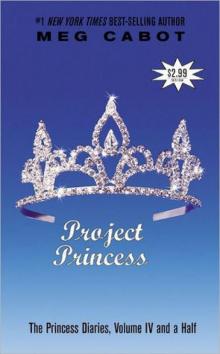 Project Princess
Project Princess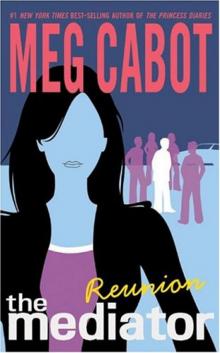 Reunion tm-3
Reunion tm-3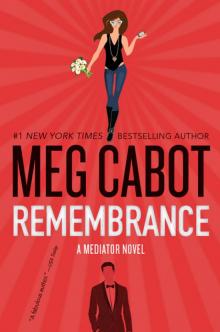 Remembrance: A Mediator Novel
Remembrance: A Mediator Novel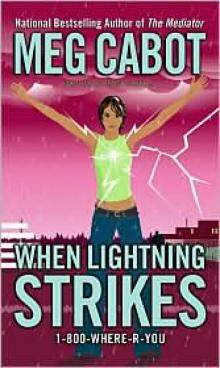 When Lightning Strikes 1-1
When Lightning Strikes 1-1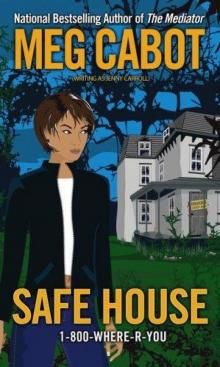 Safe House 1-3
Safe House 1-3 Teen Idol
Teen Idol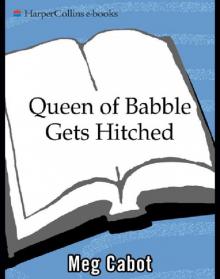 Queen of Babble Gets Hitched
Queen of Babble Gets Hitched Glitter Girls and the Great Fake Out
Glitter Girls and the Great Fake Out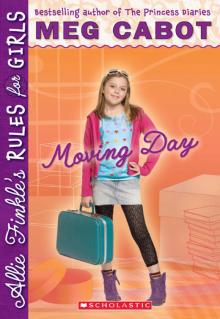 Moving Day
Moving Day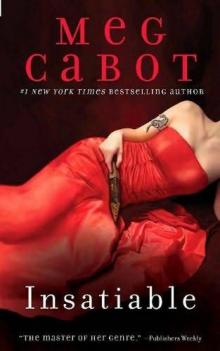 Insatiable
Insatiable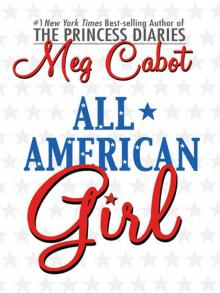 All American Girl
All American Girl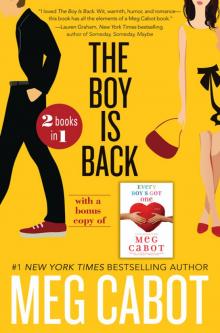 The Boy Is Back + Every Boy's Got One Bundle
The Boy Is Back + Every Boy's Got One Bundle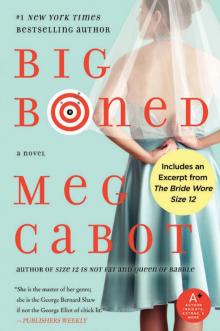 Big Boned
Big Boned Awaken
Awaken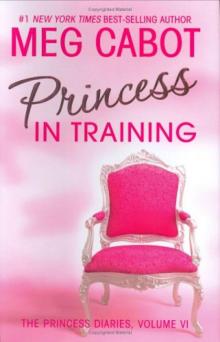 Princess in Training pd-6
Princess in Training pd-6